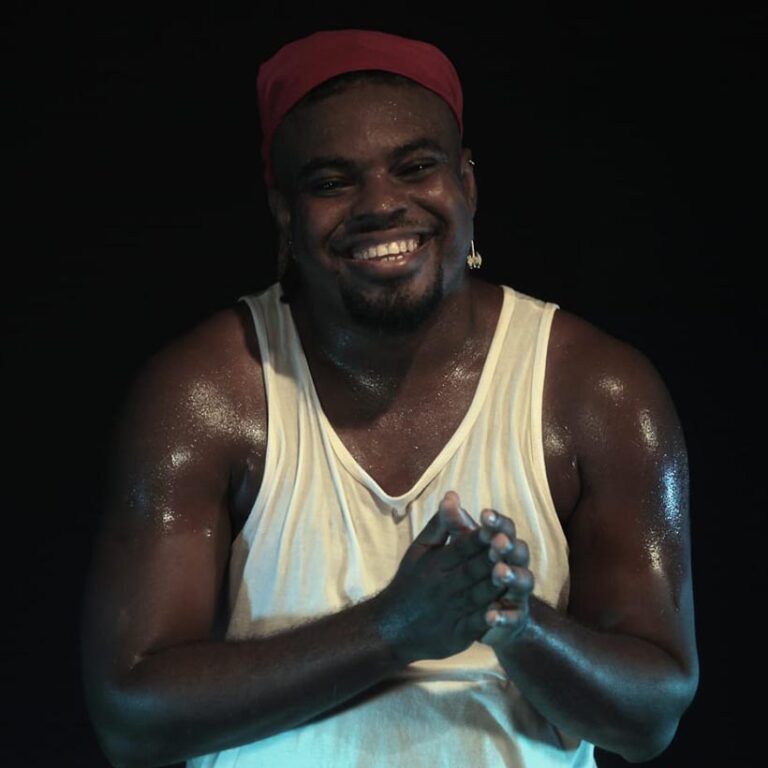BAILARINO, COREÓGRAFO, CanTOR E COMPOSITOR
Brunno de Jesus
Salvador (Bahia)
Atualizada em 22/10/2024
Brunno de Jesus é bailarino, coreógrafo, cantor e compositor. Pesquisador das culturas negras e periféricas. Licenciado em dança (UFBA, 2014), Especialista em Estudos Contemporâneos em Dança (UFBA, 2016), Mestrado em Dança (2020) e atualmente cursando o Doutorado em Dança na Universidade Federal da Bahia, na qual atuou como professor substituto (UFBA, 2020 /2021). Idealizador e diretor da Plataforma Nacional de Artes Negras. Educador no projeto Axé – Centro de Defesa e Proteção à Criança e ao Adolescente.

Foto: Sergio Isensee
BAILARINO, COREÓGRAFO, CanTOR E COMPOSITOR
Brunno de Jesus
Salvador (Bahia)
Atualizada em 22/10/2024

Foto Sergio Isensee
Brunno de Jesus é bailarino, coreógrafo, cantor e compositor. Pesquisador das culturas negras e periféricas. Licenciado em dança (UFBA, 2014), Especialista em Estudos Contemporâneos em Dança (UFBA, 2016), Mestrado em Dança (2020) e atualmente cursando o Doutorado em Dança na Universidade Federal da Bahia, na qual atuou como professor substituto (UFBA, 2020 /2021). Idealizador e diretor da Plataforma Nacional de Artes Negras. Educador no projeto Axé – Centro de Defesa e Proteção à Criança e ao Adolescente.
Histórico de realizações
Jovem artista multilinguagem, negro nascido na cidade do Salvador- Bahia. Filho de Marita de Jesus e Henrique Bispo da Silva. Como coreógrafo e diretor, assinou mais de 12 espetáculos em sua trajetória. Recebeu o Prêmio Nacional Leda Maria Martins, na categoria Ancestralidade pelo espetáculo DI-QUEBRADA [2021]. Diretor do filme documentário RAIMUNDOS: Mestre King e as Figuras Masculina da Dança na Bahia [2016], conta a história do primeiro homem e negro a graduar em dança na América Latina. Integra a Série Novos Artistas da Arte Contemporânea realizado pelo IAE – Instituto Arte na Escola [2022] Canal Futura. Lançou o primeiro álbum autoral EPA REI com 7 faixas inéditas em março de 2022, e o EP Tranca Rua em 2023. Estreou o seu solo Sample: é que nem cortar quiabo no Festival Internacional de Artes Cenicas Kuruchue no Chile, e integrou a programação da 14° Bienal Internacional de Dança do Ceará. Inquieto, inventivo, pensa a dança, o corpo na cena como possibilidade de buscar tecnologias cênicas para criar futuros e dinâmicas como modo de existir.
Sample: é que nem cortar quiabo
Sample: é que nem cortar quiabo é um jeito de corpo, um modo de entender a memória como camadas entre o tempo. Cortar quiabo para nutrir e fortalecer o desejo que move danças, move sons, vibra na pele. Alimento do orixá sango e oyá, que aquece a dança do agora. Um solo que reverencia a memória de danças que deixaram rastros e se transformam em outras danças. Quais danças dos nossos mais velhos compõem nossas camadas de memórias?
Com aproximadamente 40 minutos, o espetáculo convoca referências das danças negras baianas, em narrativas poéticas e nomes como: Nadir Nóbrega, Leda Ornelas, Marilza Oliveira, Mestre King, Augusto Omolu entre outros… Uma viagem na memória de um corpo negro contemporâneo.
O canto saudando os orixás, as estéticas que convocam a memória, a simbologia dos orixás e as sonoridades ensinam ao público a clave sonora do daró (toque para a orixá Iansã), o maculelê como dança de guerra com interação como o público, jogos de convite a dançar juntos e samplear a memória da dança negra da Bahia.
Epa Rei
Bruno de Jesus é um artista negro da cidade de Salvador, apaixonado por música desde criança. A veia artística era tão grande que ele se imaginava no palco cantando para milhões de pessoas. Essa era a sua brincadeira de criança. Desde criança batucava em latas de tinta, garrafas de vidro, além de cantar no quintal de sua casa. Sempre acompanhou seu pai nas serestas do bairro onde morava. E como todo baiano que se preze, não perdia um carnaval. Costumava ir com o pai aos desfiles dos blocos afros como Ilê Aiyê, Olodum, Os Negões, além de acompanhar a banda Timbalada e É o Tchan. Quando adulto, os caminhos de Bruno o levaram para a dança. Ele estudou e se tornou bailarino, coreógrafo, cantor e compositor brasileiro. Filho de Sàngo no Ilê Axé Onirê Unxê Omi Oyá.
Em 2014, a composição Identifique-se, uma parceria com o cantor feirense Jeferson Akenaton, ficou em 2° lugar no Festival de Música Vozes da Terra. No ano seguinte lançou seu primeiro single autoral Jogo bola. Pesquisador das culturas negras e periféricas, Bruno de Jesus fez mestrado, especialização e doutorado em dança pela Universidade Federal da Bahia. Ele também foi professor substituto no curso de dança na UFBA, passando todo o seu conhecimento para centenas de alunos. Em 2021, o coreografo, compositor e cantor recebeu o Prêmio Nacional Leda Maria Martins, na categoria Ancestralidade pelo espetáculo DI-QUEBRADA. Ele também idealizou o EPA! Encontro Periférico de Artes, realizado entre 2017 a 2021. Dirigiu o documentário RAIMUNDOS: Mestre King e as figuras masculinas da dança na Bahia. O doc conta a história do primeiro homem e negro a graduar em dança na América Latina.
Recentemente participou como intérprete da música Quando o Muzenza passar de autoria de Ney Baiano e Yure Cajazeiras no 36o Festival de Música Samba Reggae do Bloco Afro-Muzenza. O show Epa Rei, que leva o nome do seu primeiro álbum, fez abertura do Festival de Artes em Pernambuco, tendo sido apresentado também na Sala do Coro do Teatro Castro Alves em Salvador.
Lançado no início de 2022, Epa Rei traz elementos do candomblé e da cultura Iorubá. Assim como o álbum, o show constrói uma paisagem afetiva sonora numa mistura afro-pop entre poesia, toque de candomblé, sambas, sambareggae, r&b e baladas percussivas. Com grandes solos de percussão e dança, o artista traz experiências sensoriais para o público com sua música. Um show interativo e sensorial.
Plataforma Nacional de Artes Negras
A PLATAFORMA NACIONAL DE ARTES NEGRAS se consolida na sua terceira edição em 2025. Nasceu do contexto da falta, da não visibilidade e do não pertencimento. Criado e realizado por jovens negros das quebradas de Salvador que não se sentiam representados nos poucos circuitos existentes. Com duas edições de sucesso a plataforma expandiu sua missão, reformulando a marca e as atividades da programação, agora em ações interdependentes de conexões nacionais e internacionais, que pode desdobrar em qualquer momento do ano. Não mais como uma programação de festival, e sim, uma plataforma alternativa que conecta negros e negras do Brasil e do mundo por meio de suas produções artísticas, de artistas emergentes, aqueles que não compõe e/ou compõe timidamente os poucos circuitos existentes. Ou seja, uma plataforma com o propósito de fortalecer o elo com o mercado criativo sendo Salvador a cidade eixo de realização. Como exemplo, após sua expansão, a PLATAFORMA foi convidada pela Bienal Internacional de Dança do Ceará, apresentando artistas de sua última edição. subsequentemente, foi convidado um espetáculo para compor a programação em março de 2024 que reuniu África e América Latina, e mais de 7 estados brasileiros em importantes espaços de Salvador como Sala do Coro do Teatro Castro Alves, Feira de São Joaquim, Pelourinho, Terreiros de candomblé, Espaço Xisto, Estações, ônibus entres outros. O seu diferencial é ser um gerador de possibilidades de conexões e esperanças.
Corpo Homenagem
Corpo Homenagem é uma série de 12 vídeos, de 1h30 cada, que trouxe a dança para a tela da TV e redes sociais. Foram convidados 6 dançarinos e dançarinas negros e negras que foram ao estúdio da TVE apresentar um solo de dança em homenagem aos seus mestres e mestras. Com solos artísticos de autoria, interpretação e corporeidade de cada artista convidado/a, a série apresentou diversas linguagens do corpo, que transitaram pela dança afrobrasileira, pelo samba e pelas danças contemporânea e moderna. Os seis artistas negros que prestaram as homenagens, realçaram os percursos e legados de grandes nomes da arte baiana através da linguagem corporal. Cada dançarino/a escolheu um mestre/a que é referência de vida, arte e politica em sua trajetória pessoal, mas que também se estendem como referências a toda sociedade brasileira, como exemplos de luta, vanguarda e construção do saber negro diaspórico. O dançarino e coreógrafo Mestre King (in memmorian) foi homenageado por Brunno de Jesus.
Foi produzida ainda uma reportagem com cada artista, em que explicaram a relação com seus mestres e o processo criativo de cada solo. Os 6 vídeos-dança e as 6 reportagens compõem a série Corpo Homenagem, que foi exibida ao longo da programação da TVE Bahia.
Corpo Homenagem (Ficha técnica):
Realização TVE Bahia
Concepção e direção: Carolina Canguçu e Candai Calmon
Cenário e iluminação: Edmundo Júnior
Coordenação: Estúdio Sérgio Couto
Diretor de TV: Denilson Santana
Montagem: Carolina Canguçu e Marcos Fiais
Stills: Sergio Isensee
A atualização dos dados desta página bem como a veracidade das informações nela contidas são de responsabilidade de Brunno de Jesus. Caso encontre um erro ou divergência de dados, favor entrar em contato com ele a partir dos links acima ou envie mensagem para oyo.producao@gmail.com

Acesse via celular ou tablet e compartilhe.
Compartilhe esta página em outro dispositivo móvel.
QUER TER PÁGINAS NO TRILHAS DA CENA?
